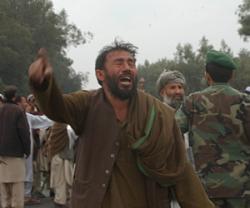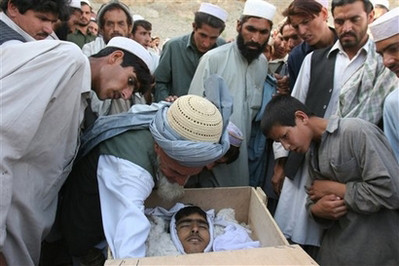A U.S. Marine Corps general has decided not to bring criminal charges against two officers who led their unit on a March 2007 killing spree that left 19 Afghan civilians dead and 50 more wounded.
The decision infuriated Afghanis. "This is too much," said Kubra Aman, an Afghan senator from Nangarhar. "First, they say it's a mistake, and after that, they let them go without charges."

An Afghan man cries as he shouts anti-American slogans after a car bomber attacked an American convoy in Barayekab in Nangarhar province, eastern Afghanistan. (AP Photo/Rahmat Gul)
A United Nations spokesperson, Aleem Siddique, made the same point in more diplomatic language. "It is disappointing that no one has been held accountable for these deaths," said Siddique. The UN "has always made clear that there must be increased transparency and accountability of all parties to this conflict if we are to retain the trust and confidence of the Afghan people."
By contrast, the U.S. media barely noticed. For its part, the New York Times featured an article on Afghanistan a few days later celebrating a "fierce battle" by a Marine unit that drove Taliban fighters outside of the southern town of Garmser. The article referenced last March's massacre--but not the Marines' decision not to press charges.
Instead, the Times quoted a NATO officer talking about the "huge optimism" of the town's residents for the operation--while downplaying the death of a 14-year-old boy and eight civilians injured during the battle, and the fact that the Marines will be moving on in a couple weeks, thus allowing the Taliban to return.
Why the media indifference? Because the U.S. occupation of Afghanistan is still seen as the "good war."
If there is one point of agreement between Republicans and Democrats, and even sections of the antiwar movement, it is that the U.S. war on Afghanistan is a legitimate response to the September 11 attacks, mainly aimed at bringing the perpetrators to justice--unlike the occupation of Iraq, which is viewed, even by sections of the Washington establishment, as "unnecessary," "illegal" and "based on lies."
George Bush and the Pentagon are currently weighing a "surge" of two additional brigades--about 7,000 troops--to Afghanistan. The Democrats' likely presidential nominee Barack Obama has repeatedly spoken in favor of sending more troops to Afghanistan--he calls the occupation of Iraq a "distraction" from the war the U.S. should be fighting.
Two additional brigades would bring total American troop strength in Afghanistan to more than 40,000 and boost the proportion of U.S. soldiers from about half to two-thirds of NATO forces.
In 2007, because of an expansion of bombing campaigns on villages, deaths of Afghans topped 6,500, the largest number since the war began more than six years ago. Deaths of U.S. soldiers last year, at 110, were also up, while other nations contributing troops to NATO forces lost a combined 111.
The level of death and destruction in Afghanistan, combined with the horrible toll that the war has exacted on U.S. soldiers, including those who return alive but forever scarred by the stress of combat, should be reason enough to oppose the war in Afghanistan.
The freelance photographer, Rahmat Gul, said he took photos of a four-wheel drive vehicle where three Afghans had been shot to death inside. An American soldier then took Gul’s camera and deleted the photos. Gul said the soldier then raised his fist as if he was going to strike Gul.
But this is only a starting point. If you look more closely at what the U.S. has done in Afghanistan and plans to do in the future, it's clear that the rhetoric about upholding democracy and making the world safer is--as in Iraq--a smokescreen to justify pursuing imperial ambitions.
FROM THE start, the U.S. cloaked its motivations for going to war in Afghanistan with talk about saving ordinary people in Afghanistan--in particular, women suffering abject oppression--from the rule of the Taliban.
But a few years before, the U.S. had quietly backed the ascendance of the Taliban, in the hope that the hard-line regime would impose order--and facilitate the oil corporation Unocal's plan to build a pipeline through the country.
No doubt, some Afghans hoped the U.S. invasion would get rid of the Taliban. But those hopes turned to bitterness and resentment as the brutality of the occupation--and the savagery of the warlords that Washington has depended on to maintain its grip--became all the more evident.
As the veteran anti-imperialist and author Tariq Ali wrote:
There have been numerous incidents of rape and rough treatment of women by [NATO] soldiers, as well as indiscriminate bombing of villages and house-to-house search-and-arrest missions. The behavior of the foreign mercenaries backing up the NATO forces is just as bad. Even sympathetic observers admit that "their alcohol consumption and patronage of a growing number of brothels in Kabul...is arousing public anger and resentment."
To this could be added the deaths by torture at the U.S.-run Bagram prison and the resuscitation of a Soviet-era security law under which detainees are being sentenced to 20-year jail terms on the basis of summary allegations by U.S. military authorities. All this creates a thirst for dignity that can only be assuaged by genuine independence.
Journalist and filmmaker John Pilger reports that members of the Revolutionary Association of the Women of Afghanistan (RAWA), bitter opponents of the Taliban, make the same point.
"We, the women of Afghanistan, only became a cause in the West following September 11, 2001, when the Taliban suddenly became the official enemy of America," Marina, a member of RAWA, explained to Pilger when he visited Afghanistan. "Yes, they persecuted women, but they were not unique, and we have resented the silence in the West over the atrocious nature of the Western-backed warlords, who are no different. They rape and kidnap and terrorize, yet they hold seats in [U.S.-backed Hamid] Karzai's government.
"In some ways, we were more secure under the Taliban. You could cross Afghanistan by road and feel secure. Now, you take your life into your hands."
IN TIME-honored fashion, the U.S. has held up a country's terrible history of poverty, repression and inequality as the pretext for imperial aggression that only aggravates poverty, repression and inequality.

Afghan villagers look at the dead body of a man, who was allegedly killed in a U.S. operation, during a funeral ceremony, in the Shinwar district of Nangarhar province, east of Kabul, Afghanistan, Saturday, May 10, 2008. Dozens of protesters blocked a road Saturday in eastern Afghanistan, claiming that U.S.-led coalition forces killed three civilians.(AP Photo/Rahmat Gul)
Photo Gallery of US victims in Afghanistan
The Afghan Victim Memorial Project by Prof. Marc
The problem is not a lack of money or troops, as George Bush and Barack Obama suggest, but the goal of the war itself. The U.S. has never sought to "liberate" Afghanistan, but to dominate it and turn it into a stable, U.S.-friendly outpost in Central Asia.
What the U.S. really wants, says Tariq Ali, is "to construct an army able to suppress its own population but incapable of defending the nation from outside powers; a civil administration with no control over planning or social infrastructure, which is in the hands of Western NGOs; and a government whose foreign policy marches in step with Washington's."
This explains why the U.S. government pressured Hamid Karzai into signing an agreement in May 2005 granting the U.S. the right to install a huge military presence in the country forever--over and against protests that erupted against the agreement before the ink was even dry.
U.S. policymakers understand that Afghanistan, like Iraq, is a strategic beachhead that can be used to spread Washington's geopolitical influence throughout Central Asia.
Sometimes, they even spell this out explicitly. An essay in the NATO Review, for example, sounds more like a threat than a call for security and peace: "In the 21st century, NATO must become an alliance founded on the Euro-Atlantic area, designed to project systemic stability beyond its borders...There can be no systemic security without Asian security, and there will be no Asian security without a strong role for the West therein."
The "humanitarian-security" case made by the U.S. establishment needs to be rejected--just as the case for the occupation of Iraq has been rejected as a pack of lies to justify Washington's drive to control oil resources and project its power throughout the Middle East.



